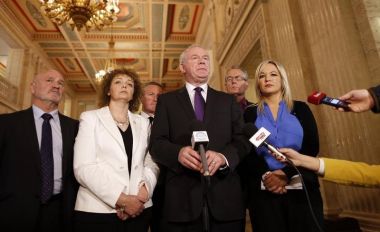Northern Ireland government on the brink of collapse after "IRA" murder

Northern Ireland's power-sharing administration was on the brink of collapse on Thursday after a murder linked to the IRA plunged the province towards the gravest crisis since a 1998 peace deal ended years of sectarian violence.
In a day of high drama in Northern Ireland, First Minister Peter Robinson stepped aside with all but one of his unionist party allies, a step that leaves the power sharing agreement between Catholic Irish nationalists and their Protestant rivals hanging by a thread.
British Prime Minister David Cameron said he was gravely concerned about the crisis which erupted when gunmen linked to the Irish Republican Army (IRA) opened fire on a former member, Kevin McGuigan, outside his Belfast home last month.
Police suspect members of the IRA, a paramilitary group that is supposed to have disbanded, were involved in the killing. Bobby Storey, a senior member of Sinn Fein, the largest Irish nationalist party, was arrested in relation to the killing and released on Thursday without charge.
"The continued existence of the IRA and the arrests that followed has pushed devolution to the brink," First Minister Robinson said as he announced he was stepping aside.
"The fact that a leading member, or leading members, of Sinn Fein have been associated with a murder indicates to us very clearly that those are unacceptable circumstances and we cannot do business as usual."
The 1998 power-sharing deal ended three decades of tit-for-tat killings between Catholic Irish nationalists, who want the province to unite with Ireland and Protestant unionists, who want to remain part of the United Kingdom, that left 3,600 dead.
The forced coalition has struggled amid intensifying sectarian bickering in recent years and talks that began this week to try to settle a string of crises are set to resume on Monday.
Both the Irish government and Sinn Fein said they would return to the negotiating table to try to find a solution.
"Bad day"
Few expect a return to the armed conflict of the so-called "Troubles", though Deputy First Minister Martin McGuinness of Sinn Fein has previously warned a stalemate would "create a vacuum that would be exploited by violent elements on all sides".
As he stepped aside, Robinson requested Britain suspend the province's assembly, a move that could force London to take direct governance of Northern Ireland, though Cameron's government said it did not support such a move and Sinn Fein warned doing so would shunt the province back to past.
The last time the parliament was suspended, in 2002, it took five years for the rival parties from the two communities to agree to sit again. Robinson has warned that if talks fail this time, it could take a decade before parliament is revived.
The crisis piles pressure on Cameron just as he grapples with a renegotiation of Britain's relationship with the European Union before a referendum on membership due by the end of 2017.
"It is a bad day for the Northern Ireland political process," Northern Ireland Secretary of State Theresa Villiers said.
"I think its also worth remembering that there have been a number of such bad days over the 20 years since the leadership of Northern Ireland undertook this great process which led to the Good Friday agreement."
She said the parties urgently needed to get together for talks and that paramilitary organisations needed to disband but added that the circumstances did not justify suspending the assembly.
Ceasefire
The United States, in a statement issued by the consulate in Belfast, urged all parties in Northern Ireland to engage in negotiations led by the British and Irish governments.
Robinson's Democratic Unionist Party (DUP), the province's largest pro-British party, had tried but failed to win support from rival parties for an adjournment of the assembly. That prompted him and all bar one of the DUP ministers to step aside.
Robinson said DUP minister Arlene Foster will remain in her post as finance minister and take over as acting first minister. Had Robinson stepped aside and not filled the vacated post, an election would have been triggered automatically.
Police suspect members of the IRA were involved in the August 12 shooting of McGuigan. Sinn Fein denies the IRA is still active, saying it "left the stage" after a 2005 ceasefire.
"If this action by the DUP is intended by them to create space for talks to begin next Monday, we will certainly do everything in our power to make that work," said McGuinness of Sinn Fein.
Irish Foreign Minister Charlie Flanagan said the parties should work together to give it "one final chance", but admitted that they were running out of time with the power-sharing institutions "on the edge of the precipice".
"If it collapses because people resign then the only way to move forward is on the basis of the rules which we agreed which means we go into election," Sinn Fein President Gerry Adams said. He said power sharing was "fledgling, difficult but still better than war".











